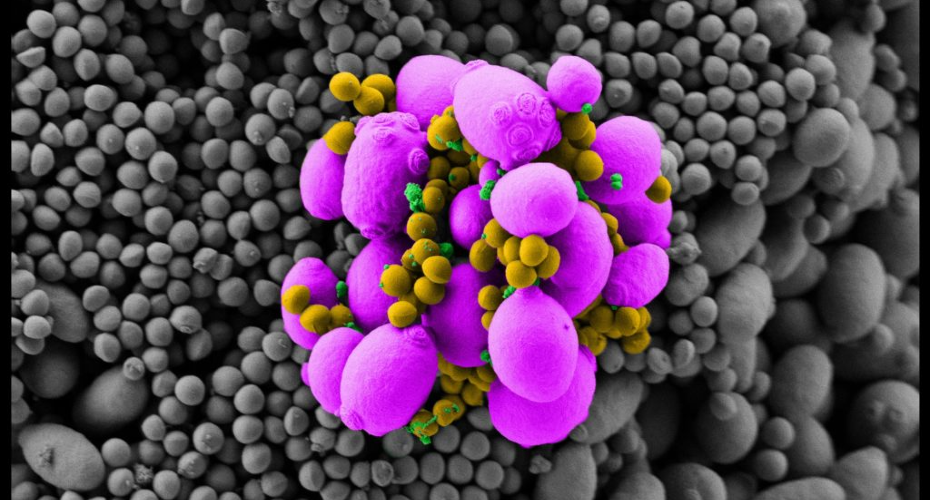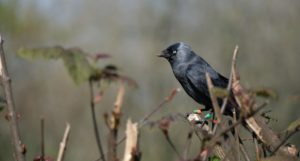Exeter kickstarts global research network, awarding £1.7 million to antifungal resistance innovations

Fungal-bacterial biofilm, by Orlando Ross and Seana Duggan.
Fifteen projects designed to reduce the growing global threat of antifungal drug resistance in low- and middle-income countries (LMICs) have received UK government funding via the University of Exeter’s FAILSAFE project.
FAILSAFE (Fungal AMR Innovations for LMICS: Solutions and Access For Everyone), is managed by the University of Exeter’s MRC Centre for Medical Mycology, in partnership with the UK Department of Health and Social Care’s Global AMR Innovation Fund (GAMRIF). GAMRIF is a One Health UK aid fund that supports research and development around the world to reduce the threat of antimicrobial resistance (AMR) in humans, animals and the environment for the benefit of people in LMICs.
In its first wave of funding awards, FAILSAFE has approved grants to support the work of 78 researchers from 13 countries, aiming to accelerate solutions for a global problem which has a particular impact in LMICs.
Fungal diseases kill as many people across the world as tuberculosis or malaria, with the highest number of cases occurring in LMICs. However, the number of drugs available to treat them is limited. Some fungi are particularly deadly to people with compromised immune systems, including children with leukaemia. Fungal diseases can also decimate crops and affect animals and agriculture. Managing crop diseases requires fungicides that can trigger cross-resistance to humans, meaning that antifungal medicines may cease to work.
Resistance to the limited number of drugs available to treat fungal diseases in human, animal and plants is increasing, meaning they may no longer be effective, known as antifungal drug resistance. This is particularly an issue in LMICs, where the burden of drug resistance is highest. Yet fungal disease and antifungal resistance is under-recognised as a serious health threat and significantly underfunded as a result.
Solutions for antifungal drug resistance are urgently needed, and the new FAILSAFE project is aiming to address this issue.
The projects awarded span five core areas:
- Addressing antifungal resistance by studying drivers and threats
- Developing new and novel antifungals and formulations
- Enhancing surveillance of fungal pathogens and antifungal resistance
- Promoting research on the generation of vaccines against fungal pathogens, particularly drug-resistant strains
- Innovating new diagnostics for fungal infections
FAILSAFE co-lead Professor Elaine Bignell, of the University of Exeter, said: “Antifungal drug resistance is a global threat to public health that requires urgent action. We’re delighted to award this first wave of funding to projects supported by FAILSAFE to advance this goal, with a particular focus on delivering benefit to low-to-middle income countries, where the burden and impact of fungal diseases is disproportionately high. From heightened surveillance to drug discovery and vaccine development, the inaugural FAILSAFE awards support the work of 78 researchers from 13 countries to develop and deliver much-needed solutions to tackle antifungal drug resistance.”
Dame Sally Davies, UK Special Envoy on AMR, said: “Antifungal resistance is a pressing, understudied global threat that demands urgent solutions. I’m delighted that GAMRIF and the Centre for Medical Mycology at the University of Exeter are partnering to support researchers worldwide to develop much needed innovations and build research expertise where it is needed most. These 15 projects mark an important step in tackling antifungal resistance, specifically designed to benefit low- and middle-income countries where the burden is greatest.”
Grants awarded in the first round of the funding totalled more than £1.7 million. Of those, two were larger grants, totalling nearly £800,000. The fund also awarded 13 smaller seed corn grants designed to kick-start projects, totalling nearly £950,000. Further rounds of funding are planned, for further details sign up to the FAILSAFE network https://cmm-failsafe.com/become-a-member/
Funding went to the following projects:
| Lead Institution | Country of Lead Institution | Project title |
| National University of the Litoral | Argentina | Tackling Azole-Resistant Aspergillus fumigatus Through Environmental Monitoring and Policy |
| Carlos Chagas Institute of Fiocruz | Brazil | Exploring the mechanisms behind the anti-cryptococcal potential of an extracellular vesicle tripeptide targeting dipeptidyl peptidase 4 |
| University of Exeter | UK | Worming away at fungi: helminth secreted products as a new class of antifungal therapeutics |
| Wits Health Consortium (Pty) Ltd | South Africa | SCARS: Surveillance of Candida Antifungal Resistance in the Southern African Region |
| University of the Free State (UFS) | South Africa | Potential of topical sapienic acid-rich lipids to prevent skin colonisation by Candida auris. |
| Federal University of Rio de Janeiro (UFRJ) | Brazil | Advancing Treatment Options for Feline Sporotrichosis: Evaluating D13 in Clinical Trials |
| Global Action for Fungal Infections (GAFFI) | UK | A collection of proven, probable, possible and control cases of Fungal Disease to develop AI Fungal Disease algorithms. |
| University of Birmingham | UK | Enhancing fluconazole efficacy and precision through novel molecular and nanoscale approaches. |
| KU Leuven | Belgium | In Vivo Efficacy Of An Innovative Vaccine Approach Targeting Debilitating And Life-Threatening Mucorales Infections |
| University of the Free State | South Africa | Understanding genome and cell surface protein evolution during echinocandin-induced cell wall remodelling in Candida species to identify biomarkers for rapid detection of drug resistance |
| Department of Microbiology, Faculty of Science, Chulalongkorn University | Thailand | Strengthening Agricultural Biosecurity in Southeast Asia: A Multinational Biobank Initiative for WHO Filamentous Fungal Pathogens to Enhance Pathogen Monitoring and Resistance Detection |
| Corporación para Investigaciones Biológicas (CIB) | Colombia | Analytical validation of electrochemical immunosensor prototype for the diagnosis of Histoplasmosis |
| IMU University | Malaysia | Identification of new fungal Glycosylphosphatidylinositol (GPI)-anchored wall transfer protein 1 (GWT1) inhibitors. |
| University of Manchester | UK | Developing approaches to limit the impact of agricultural fungicides in driving clinical antifungal resistance |
| Institute of Biosciences, Newcastle University | UK | Miltefosine – a dual purpose antifungal to mitigate antifungal resistance |



